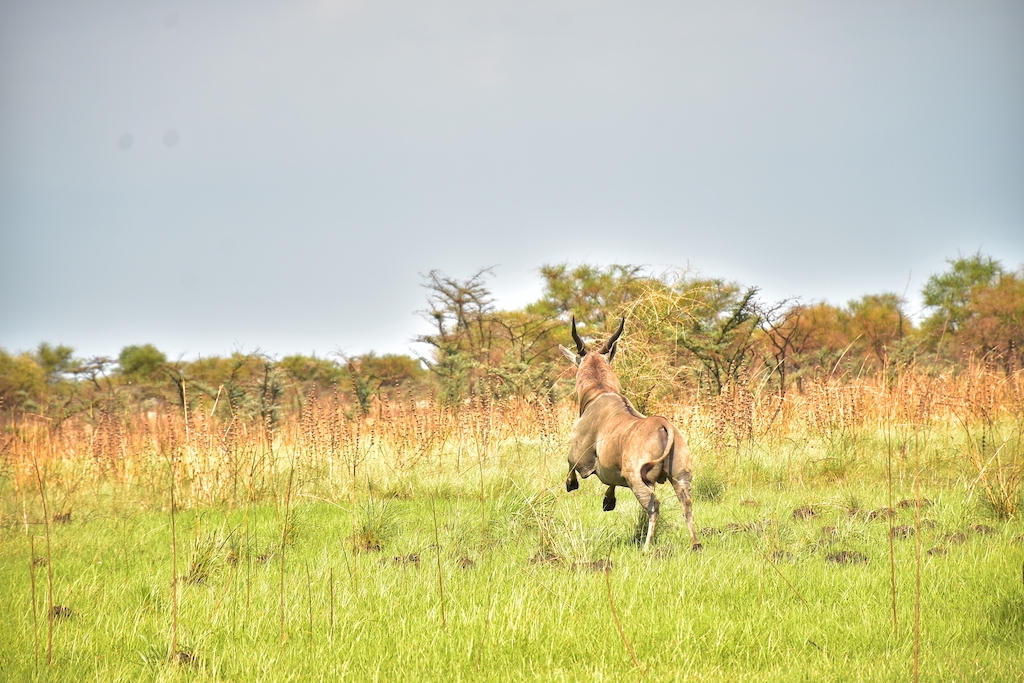
15 Sep Why wildlife crimes are easily committed in South Sudan
South Sudan has a Wildlife Act, but lacks the capacity to enforce the law effectively and wildlife crimes are rarely prosecuted. Diing Magot and Denis Morris Mimbugbe investigate for #WildEye Eastern Africa

Since the signing in 2018 of a peace agreement there has been an improvement in the arresting and prosecuting of perpetrators of wildlife crimes, but more needs to be done. Photo: Mustafa Osman
South Sudan is losing its wildlife population to illegal poaching and trafficking, with serious consequences for the environment, tourism and the economy.
Since the signing in 2018 of a peace agreement there has been an improvement in the arresting and prosecuting of perpetrators of wildlife crimes, but more needs to be done, said Brigadier General Mathieu J Machonyjok, spokesperson for the Ministry of Wildlife.
Machonyjok believes poaching and trafficking are still rampant in the country despite the government’s efforts to stop it. He says wildlife crimes are committed in all national parks in the country.
These parks include Badingilo, located in the Central Equatoria state; Boma, located in the greater Pibor Administrative area; Nimule, in Eastern Equatoria state; and Western Equatoria State Park, in Western Bhar Ghazel.
“The targeted species are ungulates poached for meat,” he said. “Poached and trafficking items are confiscated as exhibits, and fines and imprisonment are applied on the traffickers, who are mostly after tusks, horns, skins, scales, and bones.”
In June 2023 Pibor and the Badingilo conservation areas of Central Equatoria experienced an “extraordinary massacre” of white-eared kob and tiang species by poachers after bushmeat. Machonyjok said. “Also, the ministry lost one of its personnel to poachers.”
Machonyjok said seizures and many arrests were made after this incident. The suspected poachers who allegedly carried out this act are being prosecuted.
“Juba [the capital] is the main city that poachers bring their products to. Products like tusks, horns, or skins illegally exit the country through Juba airport and through posts on our borders with Sudan or Kenya,” he said.
Data quest
For seven months during the course of our #WildEye Eastern Africa investigation, we attempted to acquire data on arrests and court cases of wildlife crime in South Sudan from 2017 onward from the Ministry of Wildlife Conservation and Tourism. This quest included many correspondences and meetings with officials. Access to information in South Sudan is governed by the 2013 Right of Access to Information Act, which gives broad rights to citizens for access to public records.
But after spending several days in the wildlife ministry offices, we were only able to acquire official information on nine recent arrests made by law enforcement and wildlife officials between January and April 2023. Two of the seizures occurred around Bandingilo National Park to the northwest of Juba, including a case where 200 animals were killed.
The ministry declared that the suspects in these cases were arrested and that the court cases were ongoing. However, the ministry does not keep information on court proceedings or outcomes, according to Lieutenant General Aggrey Lasu Wani, assistant director general for law enforcement at the South Sudan National Wildlife Service.
After visiting the South Sudan High Court for several weeks, we were only able to get information on five recent cases regarding unspecified bushmeat: four from arrests that occurred during the first months of 2023, which have not yet been prosecuted, and one prosecuted case from 2021. Most occurred in Mangala and Bandingilo National Parks.
The wildlife ministry said it could not find historical cases of wildlife crime that occurred between 2017 and 2022 in the new computer-based system that they are now using. The courts were also unable to trace the manual ledger book where the cases had been recorded.
Our pre-2023 data is therefore based on publicly available news reports.
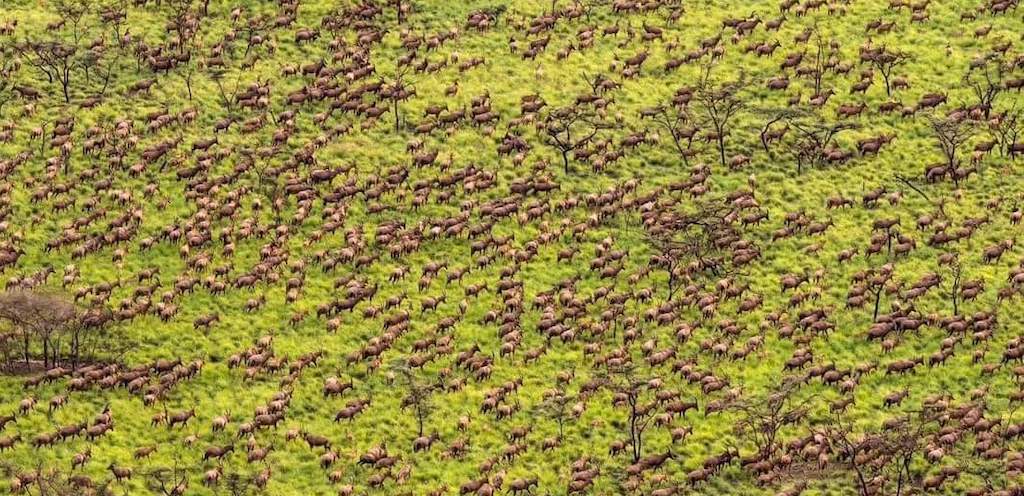
Boma National Park in the south east of the country contains the second-largest land mammal migration in Africa. Photo courtesy Eye Radio
Insecurity
Before the civil war that led to South Sudan’s independence in 2011, it was home to about 2,500 elephants, the endemic Nile lechwe, white-eared kob, tiang, bongo, Mongalla antelope, wild dogs, hundreds of giraffes, and chimpanzee populations.
But this is no longer the case. These numbers have reduced tremendously due to poaching.
A 2018 UN Environment report estimates that the number of elephants in the country declined from about 80,000 in the 1970s to less than 2,500 in 2007. During the same period, buffalos declined from 96,000 to less than 10,000, while giraffes reduced from 13,000 to about 500.
The poaching and trafficking are coupled with illegal mining, timber harvesting, and charcoal production in the protected areas, which endanger the wild animals’ lives, habitats and their food sources.
Insecurity in the country, especially after the 2013 and 2016 civil wars, led to a steady flow of firearms into civilian communities at a time when the population is facing economic hardships. Subsequently, some civilians and security officials reportedly use these easily accessed guns to poach for bushmeat, which they sell for income.
According to information we collected for #WildEye Eastern Africa from news reports and the Wildlife Ministry, people arrested with bushmeat have included soldiers and a major from the South Sudan army, a commissioner of Lafon County (which includes Bandingilo National Park), and a national security officer. The army major was released without charges or explanation, according to a report by the Enough Project.
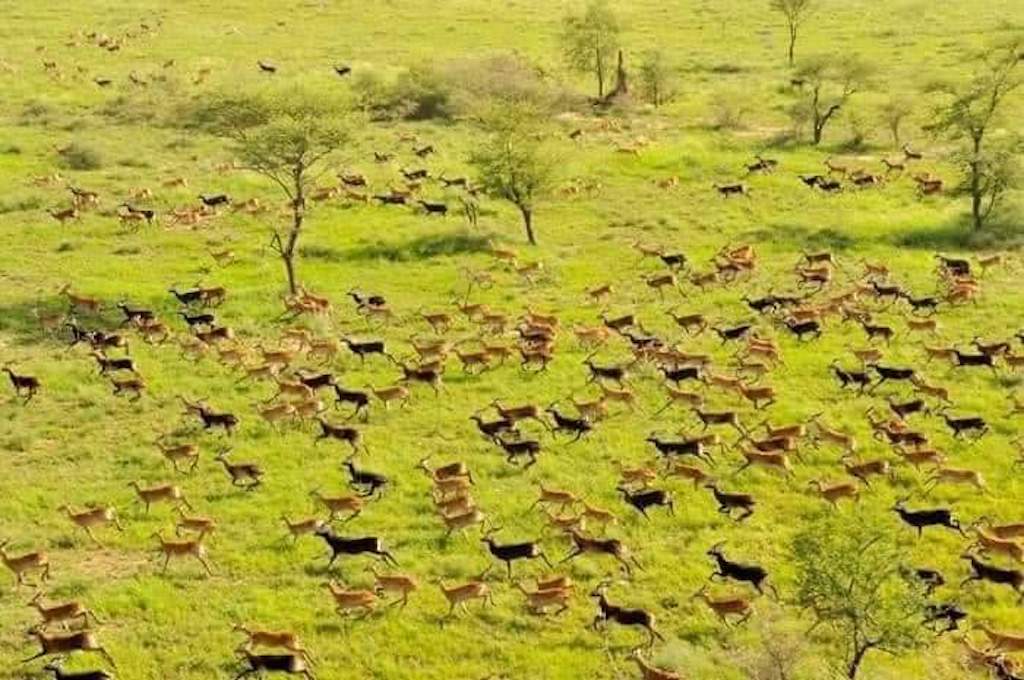
Antelopes are the most poached wild animals in South Sudan, primarily for bushmeat. Photo courtesy Eye Radio
State of emergency
Clement Liba, a member of the State Legislative Assembly in Western Equatoria, Yambio, argues that the declaration of a state of emergency in the country during the war helped to skyrocket wildlife cases.
“These are people who are outlawed, and then when they are in the bush, sometimes they spend two days, three days without food. The only way to survive is to hide, kill an animal, so this drastically reduced the number of animals. Even the rampant gunshots scare the wild animals,” he said.
Wildlife experts say antelopes are the most poached wild animals in South Sudan, primarily for bushmeat. Second on this list are the elephants, which are killed for ivory that is smuggled out of the country through Kenya, Ethiopia, Uganda, Egypt and Sudan to markets as far as China and Malaysia.
Edward Yakani, the executive director of Community Empowerment for Progress Organisation (CEPO), says this illegal activity results in the loss of wild animals for tourism: “We know poachers are doing large-scale poaching nationwide. We are losing a huge number of animals, and we are even losing the value of our tourism due to illegal poaching activities.”
In 2016, 10 kilograms of frozen pangolin meat were discovered by sniffer dogs at Juba International Airport, reportedly belonging to a Chinese national working in the oil fields of Paloich as an engineer. The suspected smuggler was released shortly after his arrest, according to information collected for #WildEye Eastern Africa from the Enough Project.
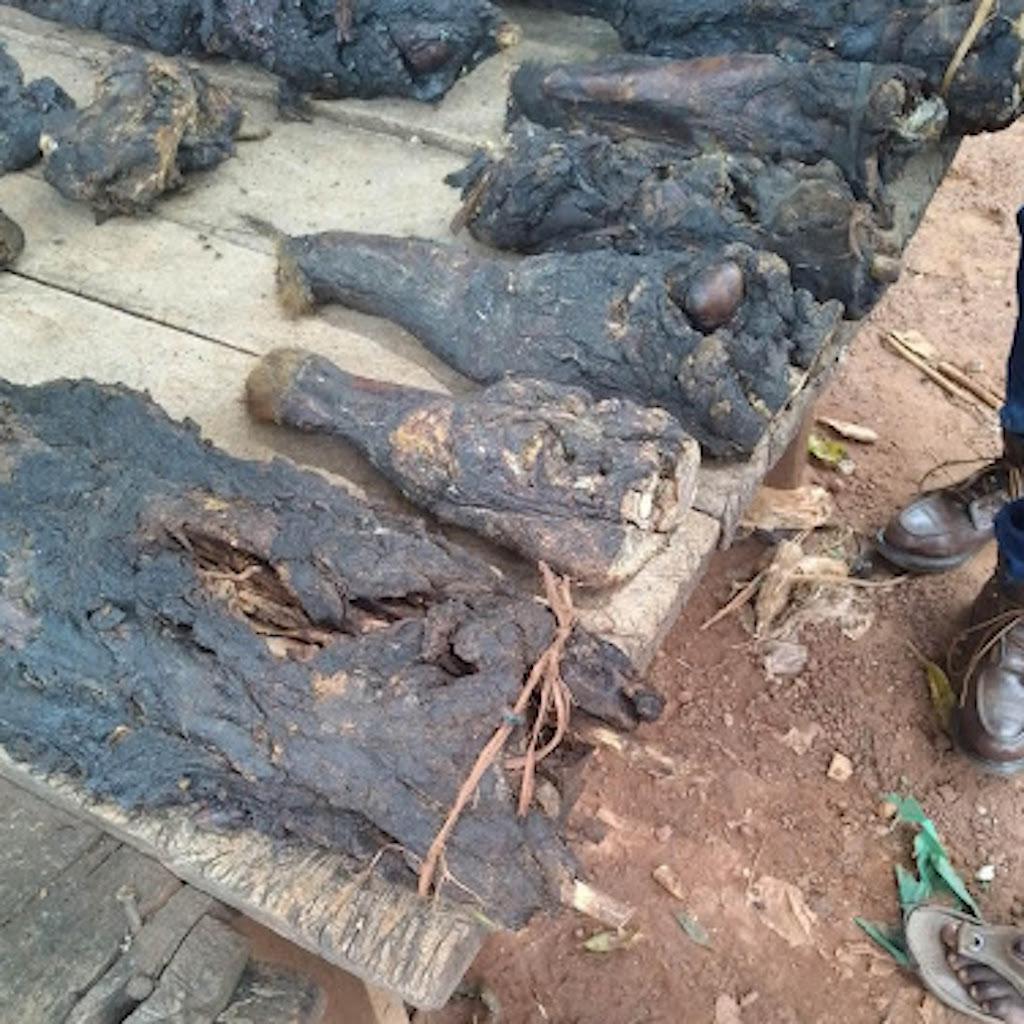
In Western Equatoria bushmeat is sold openly, and there are no restrictions on trading and eating it. Photo supplied
Wildlife court
Uganda, South Sudan’s neighbour in the south, established a wildlife court to hear wildlife crimes in 2017. The court has been credited for clamping down on wildlife crime. This court has handed criminals several punishments, including a jail term of life in prison for an ivory trader.
Visits to the South Sudan High Court indicated there exists a special court for wildlife crimes with a judge assigned to these cases. However, wildlife cases were still mixed up with other cases in the manual ledgers – one of the reasons they could not be retrieved, according to a source in the police court who asked to remain anonymous to protect their job.
Simon Kalesto, an environmental conservation consultant in Yambio and Torit, said in Western Equatoria bushmeat is sold openly, and there are no restrictions on trading and eating bushmeat. “Whenever the hunters are arrested with the bundles of meat, returning from poaching, the only punishment they get is confiscation of their guns and the meat,” said Kalesto.
Such punishments, he said, are not a deterrent to stop the crimes.
But Brigadier General Machonyjok, the spokesman for the Ministry of Wildlife, believes the current law is strong enough to control wildlife crimes in the country.
“Our Ministry has put forward severe punishment for those who violate the rules for wildlife conservation. The law protects these species. We have the right to capture and seize all items used in poaching and illegal trade, such as the vehicles, bicycles, weapons, or anything used,” he said.
Although South Sudan has a Wildlife Act, as most African countries do, it does not have “elaborate and comprehensive wildlife policies and laws” to enforce this Act, according to research in 2013. Analysts believe that this is the reason why wildlife crimes are rarely prosecuted in South Sudan.
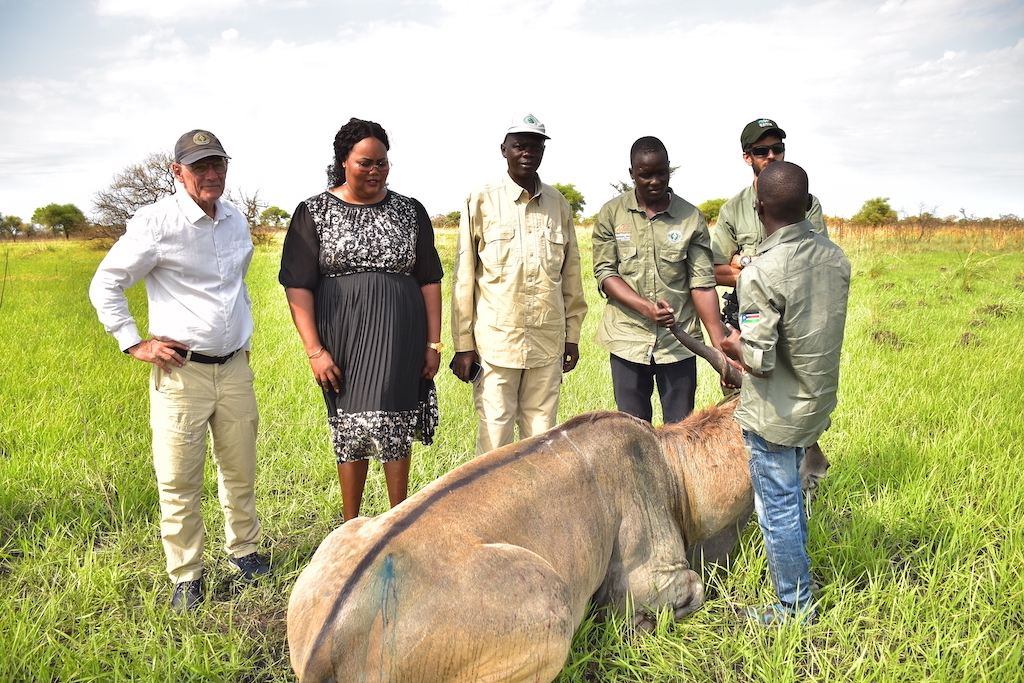
Officials from the Ministry of Environment and Forestry attend the tagging of a buck by the Ministry of Wildlife at Badingilo National Park. Photo: Mustafa Osman
Rays of hope
Yakani believes the presence of wildlife offices across the country in areas including parks and airports, coupled with the sensitisation of communities against depending on bushmeat, will help to reduce poaching in the country.
Kalesto said the Western Equatoria fauna and flora team is carrying out a census of all wild animals in the game reserves and parks around the state to ascertain their numbers. This is hoped to boost efforts to conserve the animals and fight against poaching.
Through the Ministry of Wildlife and Conservation, the government has also introduced regular inspection of goods at Juba International Airport and all entry points for wild animal products.
And the presence of wildlife officers at checkpoints on major roads in the country to detect bushmeat or any other wildlife products is also a boost in the fight against poaching.
“We must stop poaching in South Sudan to conserve the wild animals for national development,” said Clement Liba.
However, lack of funds hinders scaling up activities of the Wildlife Ministry to fight wildlife crime.
“We planned for an operation on major roads entering Juba which we suspected are facilitating trading of meat and other wildlife trophies finding their way to other countries through Juba Airport. This can only be possible if funds are available to us,” wrote Lieutenant General Aggrey Lasu Wani, assistant director general for law enforcement at the National Wildlife Service, in an official statement submitted to InfoNile.
This story was supported by InfoNile, in collaboration with the Oxpeckers #WildEye Eastern Africa project, with funding from Earth Journalism Network's Biodiversity Media Initiative project
You can follow these and other environmental crime incidents in the region on our #WildEye Eastern Africa mapping tool
